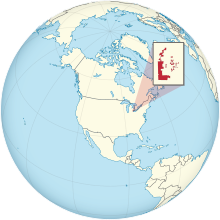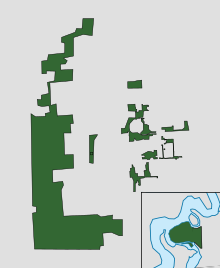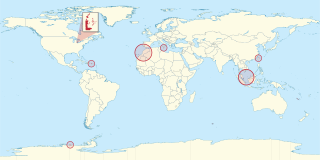Free Socialist State of Paloma
Free Socialist State of Paloma | |
|---|---|
| Motto: Speramus Meliora; Resurget Cineribus" (Latin) "We Hope For Better Things; It Shall Rise From the Ashes" Other traditional mottos
| |
| Anthem: "Canción de los Trabajadores Paloman" (Spanish) "Paloman Workers' Hymn" | |
| State Seal of Paloma | |
| Capital | None (de jure) |
| Official languages | |
| Writing system | Latin alphabet |
| Ethnic groups (2020) | |
| Religion |
|
| Demonym(s) | Paloman |
| Government | Federal Marxist–Leninist one-party socialist republic under a assembly-independent anocratic system |
| Aidan McGrath | |
| Jack Morris | |
| Abrams Wiucki-Dunswed | |
| Legislature | Supreme Paloman (nominal, suspended) Junta for Change and National Guidance (actual) |
| Establishment | |
• Independence from United States | 7 November 2019 |
• Maria Conference | 19 November 2019 |
• Socialist state created | 20 November 2019 |
• Current constitution | 13 March 2020 |
| 25 March 2020 | |
| Area | |
• Total | 2,072 km2 (800 sq mi) |
| Population | |
• Estimate | Citizens: 57 |
| GDP (nominal) | 2019 estimate |
• Total | $12.24 SPD (estimate) |
• Per capita | $0.24 SPD |
| Currency | Paloman dinero (SPD) |
| Time zone | UTC−4, -6, -8, +8 |
| Date format | dd/mm/yy yyyy-mm-dd (PSC) |
| Driving side | right |
| Calling code | +1 |
| Internet TLD | .pl (de jure) |
Website palomagov.org | |
Paloma ([/pʌˈloʊ.mə/] ![]() Listen (help·info)), officially the Free Socialist State of Paloma (Gratis Estado Socialista de Paloma; GESP ), is a self-proclaimed republic, sovereign state and proto-state, though it is commonly referred to as a micronation by external sources. Most of its territory is located in the U.S. state of Michigan. It is made up of four major administrative divisions and multiple insular areas spread across mostly North America. Though Paloma lacks a formally mandated capital by law, Paloma City is considered to the de facto capital city and current residence of office of the President.
Listen (help·info)), officially the Free Socialist State of Paloma (Gratis Estado Socialista de Paloma; GESP ), is a self-proclaimed republic, sovereign state and proto-state, though it is commonly referred to as a micronation by external sources. Most of its territory is located in the U.S. state of Michigan. It is made up of four major administrative divisions and multiple insular areas spread across mostly North America. Though Paloma lacks a formally mandated capital by law, Paloma City is considered to the de facto capital city and current residence of office of the President.
Since the establishment of the Free Socialist State of Paloma in 2019, Paloma has been a federal one-party socialist republic, and is one of the few active ones in micronationalism. Paloma declared independence from the United States by a movement lead by Aidan McGrath and a few others. This movement would later hold a conference which pushed for a socialist state to be created and on 20 November 2019 Paloma was formed.
Paloma is member of the Micronational Olympic Federation, and is a former member of the Grand Unified Micronational. Paloma is officially bilingual at the federal level, using the English and Spanish languages on signs and official documents however the government operates completely in English. The language customs of Paloma are enforced by the Paloman Language Police.
Etymology
Paloma is derived from Latin "palumbus", which means "dove", a symbol of peace. The name also can be understood as the Holy Spirit symbolized in this bird. The word is a very popular Spanish name for females.
History
Pre-Paloman history
When the first European explorers arrived in what is modern day Paloma, the most of the area was home the indigenous Algonquian peoples, which include the Anishinaabe groups of Ojibwe, Odaawaa/Odawa (Ottawa), Boodewaadamii/Bodéwadmi (Potawatomi). The area was also populated by the Wyandot tribes. These nations co-existed peacefully as part of a loose confederation called the Council of Three Fires. The Wyandot were an Iroquoian-speaking people in this area; they were historically known as the Huron people by the French people. The area may have been populated by Natives perhaps as early as 11,000 BCE.
French voyageurs and coureurs des bois explored and settled in areas around Paloma in the 17th century with the earliest expedition being in 1622. The largest permanent European settlement established around Paloma was Detroit which was founded by Antoine de la mothe Cadillac. From 1535 to 1763, area of Paloma remained in the possession of France as a colony until it was ceded to Great Britain in the 1763 Treaty of Paris.
While under British hands, the area was in the Province of Quebec apart of British America. The area around Paloma was near many locations and meetings durring the War of 1812 which was fought between the British and the United States such as the Battle of Frenchtown or the Siege of Detroit. The area was claimed by the United States in 1787 as apart of the Northwest Territory however this would be disputed by the British until 1791 when it officially became apart of the United States.
The Northwest Territory only lasted a few years until it was reformed into the Indiana Territory by former U.S President John Adams in 1800. This territory was then again reformed into the Michigan Territory in 1805. Michigan received American statehood in 1837 and from this point forward until the Paloman declaration independence the area claimed by Paloma was known as being apart Michigan.
Declaration of independence
A group of Michiganders fed up with the current state of the United States and its politics and its freedom and thought that experimenting with a new form of government would be necessary. On 7 November 2019, Paloma declared independence from the United States and declared its self as Paloma and proclaimed a provisional government. This provisional government was lead by Aidan McGrath. The provisional government lasted around a week and during the period of its existence nothing actually happened until the Maria Conference was held. This timeframe of Paloman history is usually referred to as the dark period of Paloma.
Maria Conference and Socialist transition
On 20 November 2019, at Heritage Park in Taylor, Michigan, was a brief conference including sixteen members of the Paloman declaration of independence including current president, Aidan McGrath.[3] They agreed to abolish imperialism in favor of Marxist and Leninist ideas. The sixteen members at this short conference became what is known as the Paloman regime or the "big sixteen", which discreetly control Paloma and its Government up until December. In December, the Paloman regime became an isolationist dictatorship lead by McGrath with goals to form a efficient communist-state. During this period the government mostly focused on the armed forces and had lack of interest in international affaris, also during this time a small personality cult grew around McGrath and then vice president, Jack Morris, however this cult of personality would end shortly in the upcoming months.
Contemporary history
After power was given to Aidan McGrath he reformed the state into a a republic however maintained most powers while dictator, McGrath enacted the Supreme Paloman which acts as the national legislature to maintain most foreign and national affairs. Under the Supreme Paloman over a dozen laws have been passed. Paloma expanded and formed originally three provinces and multi other administrative divisions. Currently Paloma has four provinces, Pajaro, Tejabasco, Taylor and Castejón. Paloma has since faced a rapid expansion around the world gaining territory in Northwest Africa and Southeastern Asia.
Paloma has since had around two vice presidential elections with the first occurring in 2020 and the second in 2021. Although Paloma has yearly elections the majority of Vice Presidents have been placed in office by the President or Supreme Paloman due to impeachments or resignations, a notable impeachment was that of former Vice President Charles Burgardt, who was impeached after attempting to have the Paloman territory of San Souci gain independence due to complications he had with the Paloman government and political differences; he is the only Paloman vice president removed for treason.
Geography
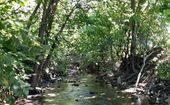
Paloma is in mostly swampy marsh land in most areas without a population. Paloma is mostly all hilly and flat terrain with the most flat areas being areas that have been developed. The majority of Paloma drains into the Ecorse River and its branchs, like the Sexton and Kilfoil drain which runs through most of Metropolitan Paloma.
The Sexton and Kilfoil drain is the second largest behind Disbrow drain which is essentially a man-made lake. Both of these areas are very popular for fishing and hunting game.
Paloma shares a border with the United States and the State of Michigan with its mainland, it also shares a border with its territories Morocco and Malaysia with its territories making Paloma a non-contiguous transcontinental country. These lands boast many forms of exotic nature compared to Mainland Paloma with most territories being tropical and jungle like.
Wildlife and conservation
Paloma is a Megadiverse country which many different Endemic species. Wildlife conservation is extremely important to the Paloman government. The Paloman government has land and wildlife protection laws. Mainland Paloma boasts many forms of wildlife and plants, including a few Bald Eagles nests. The Ministry of Environmental Protection (MPA) plays a major role in maintaining Paloman nature and beauty.
Many challenges with conserving Paloman nature and wildlife has to be enivromental. According to a 2021 study done by the MPA states that Palomas main waterway, the Sexton and Kilfoil drain has high traces of toxins and unsafe bacteria.
Demographics
Population
Demographically and ethnically, Paloma is very diverse due to its roots and people deriving from places around the world. Paloma is reported to have 51 residents as of September 2, 2021. All Palomans are immigrants, there has never been a person born in Paloma.
White Palomans of European ancestry, mostly German, Irish, English, and French, including White Hispanic and Latino Americans from Latin America, form the largest racial group, at 90% of the population. Black Palomans constitute the nation's largest racial minority and third-largest ancestry group, and are around 6% of the total U.S. population. Asian Palomans are the country's second-largest racial minority (the three largest Asian ethnic groups are Malay Palomans and Arab Palomans).
Almost all Palomans not including territorial and non residential citizens live near, live in or work near Paloma City and Salvadora.
Religion
Paloma can be considered by most as a majority Christian country with 70% of the population claiming to be Christian in the Paloman census. Out of the Christians the largest groups of Christians in Paloma were Catholics, Lutherans, and Pentecostals. The second largest religious group in Paloma is Muslims with 7% of the population following Islam, these included mostly Sunnis and Bektashis. With a growing Muslim population, some territories of Paloma are allowing Islamic law in the criminal code for enforcement on the Muslim populations. This is mostly prominent in administrative divisions of and Paloman Malaya. The rest of the population were either nothing or atheists.
Government and politics
- See also: Supreme Paloman and Supreme Court of Paloma
Paloma is a federal Marxist-Leninist republic of four provinces, three Autonomous cities, three territories. Paloma's constitution states that Paloma is a "socialist state under the people's democratic dictatorship led by the working class and based on the alliance of workers and peasants", and that the state organs "apply the principle of democratic federalism." The Paloman government has been variously described as communist and socialist, but also as authoritarian and corporatist, with heavy restrictions in many areas, most notably against free access to press.
The federal government comprises three branches:
- Legislative: The unicameral Supreme Paloman, made up of governors and representatives of the administrative divisions, makes federal law, approves treaties and can impeach government members with approval of the President.
- Executive: The president is the commander-in-chief of the military, can veto legislative bills before they become law (subject to congressional override), and de facto appoints governors to serve in the Supreme Paloman and Supreme Court.
- Judicial: The Supreme Court, whose judges are appointed by the president or the Supreme Paloman, interpret laws and overturn those they find unconstitutional and anti-Paloman.
The Supreme Paloman has eight voting members, each representing a province. Supreme Paloman seats belong to the governors or administrators of each province which are de jure elected by the the provinces citizens however they are usually de facto gain a seat when de facto appointed as a governor or administrator of a province by the president. Each state recives around one seat unless the population of the province is over 20. Supreme Paloman also has seats for its territories which act as non-voting members during meetings.
The Supreme Court, led by the chief justice of Paloma, has two members, who serve for life usually until death or retirement.
Communist Party
- See also: Communist Party of Paloma
| Party | Ideology | Spectrum | Leader | Foundation | SP seats | Flag | ||
|---|---|---|---|---|---|---|---|---|
| Communist Party | CPP | Marxism–Leninism |
Left | Aidan McGrath | 20 November 2019 | 6 / 6
|
||
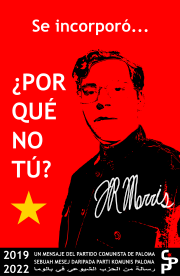
Since 2019, the main body of the Paloman constitution declares that "the defining feature of socialism and communism is the leadership of the Communist Party of Paloma (CPP). The 2019 amendments constitutionalized the one-party state status of Paloma, wherein the General Secretary (party leader) holds ultimate power and authority over state and government and serves as the paramount leader of Paloma. McGrath's most important title is general secretary, the most powerful position in the Communist Party. In Paloma’s one-party system, this ranking gives him virtually unchecked authority over the government. The state press describe the elected Congress as a "rubber stamp" body.
Administrative divisions
Paloma is divided into 3 prefectures, 2 autonomous cities (Punto de Sal and Ponce) and 2 territories.
The primary first-level political division of Paloma is the prefecture. There are 3 prefectures, which are bound together in a union. All provincial governments are modeled off the Federal government and Supreme Paloman. The primary political and administrative entity of Paloma is the pfecture. Tejabasco calls itself a "chartered provinces" and Pajaro calls itself a "free province" although it is not a province. The terms do not reflect the political stance of the prefecture or the government form. All prefectures are virtually equal in governance and practice.
| Map | Code | Name | Area | Classification |
|---|---|---|---|---|
| CLW | 7.12km² (4.42 sq mi) |
Prefecture
| ||
| GRI | 9.78km² (6.07 sq mi) |
Prefecture
| ||
| WRW | 2.14km² (1.32 sq mi) |
Prefecture
| ||
| TML | 10.33km² (6.41 sq mi) |
Autonomous City
|
Federal government
- See also: Government of Paloma
The President is supreme head over government, he can veto and pass things without consent of the national legislature, however this method is mostly avoided to prevent small and major drama in government. The Vice President is the second in command to advise heading over government, he has the succession power over the President if death occurs or resignation. He can take up the head in a meeting if the President is absent and Receive the power to veto and pass things without consent of the Supreme Paloman like the President.
The Supreme Paloman is Palomas national legislature and is a unicameral body of eight seats. The Supreme Paloman members are all governors or leaders of major administrative divisions in Paloma and have the right to produce and vote on legislation. Legislation from the Supreme Paloman can however be vetoed by the President.
Foreign relations
The Socialist State of Paloma has very little contact with other nations since 2019. Paloma currently makes small interactions with other Micronations and municipal government. Paloma as pushing for a good foreign policy is attempting to retain more diplomatic actions and mutual agreement treaties with other Micronations
Military
The Paloman People's Army (PPA) is the military and national defense of Paloma which formed a few days after Paloman independence. The Army is divided into four branches: Ground Force, Navy, Air Force and Space Force. The current largest branches are the Ground Force and Navy.
Economy
This section is empty. You can help by adding to it. (June 2022) |
Infrastructure
Transportation
Culture
Paloman culture derives from the U.S. state of Michigan, and the countries of Canada and Spain.
Literature, philosophy, and visual art
Food
Sports
See also
Notes
References
- ↑ The Constitution of the Republic of South Africa (2013 English version ed.). Constitutional Court of South Africa. 2013. ch. 1, s. 6. https://www.concourt.org.za/images/phocadownload/the_text/english-2013.pdf.
- ↑ "Electricity 101". United States Department of Energy. Retrieved July 14, 2021.
- ↑ Location of bridge is over Coan Lake, Heritage Park, Taylor, Michigan.




